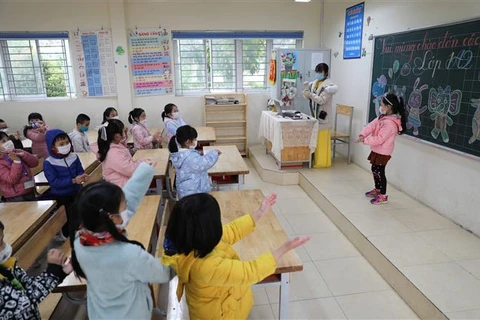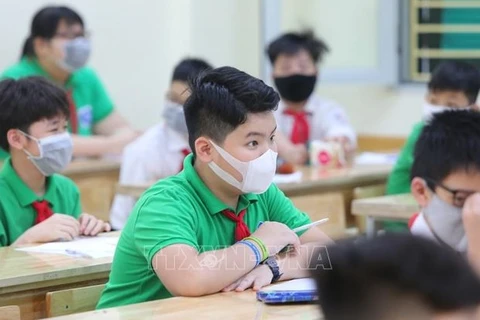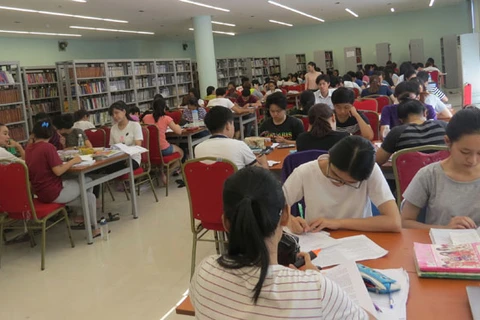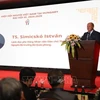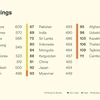 Students aged 13-17 years old usually face problems that can be hard to overcome, if they do not receive the proper support and care from family and school. (Photo: VNA)
Students aged 13-17 years old usually face problems that can be hard to overcome, if they do not receive the proper support and care from family and school. (Photo: VNA) However, only 30 percent of the surveyed participants said that their parents and guardians understood their concerns.
Meanwhile, only 40 percent of the surveyed participants said their parents knew what they do in their free time.
The data was collected in 2019 when Vietnam, for the second time, conducted the Global School-based Student Health Survey (GSHS) which is designed to help countries measure and assess behavioural risk factors among students aged 13–17 years.
The report on the results of the Vietnam’s GSHS 2019 was released on Monday by the World Health Organisation and the Ministry of Health.
The report explored health behaviours among students between grades eight and 12 in the country and the trends of these factors since 2013. The survey topics included dietary behaviours, hygiene, mental health, physical activity, protective factors, sexual behaviours, substance use (alcohol, tobacco and drug), violence and unintentional injury and vision screening.
The survey also found that the rate of students having sex for the first time before the age of 14 has doubled from 1.45 percent in 2013 to 3.51 percent in 2019.
According to the 2019 survey, among students who had sexual intercourse, more than 42 percent of them used condoms and 44 percent used other methods of birth control — lower than 2013.
About 63 percent of them said that they used condoms during their latest sexual intercourse.
Children in Vietnam tend to take more physical activities as the rate of doing exercises 60 minutes a day, five days a week increased from 20.5 percent in 2013 to nearly 22 percent in 2019.
However, the percentage of students who are overweight and obese increased. The number of people eating fast food at least once a week increased from more than 30 percent in 2013 to over 54 percent in 2019.
On average, 2.6 percent of the surveyed students across the country said they used e-cigarettes, but in Hà Nội and HCM City, the percentage of students smoking e-cigarettes accounted for 7.9 percent.
Speaking at the report launching ceremony, Associate Professor, Dr Tran Thi Tuyet Hanh from the University of Public Health, a representative of the research team, said that the results on the students’ mental health were a group of risk factors that should be kept in mind because the data was collected before the COVID-19 outbreak.
"If the survey was conducted during the COVID-19 pandemic, the rates would have been probably higher," Hanh said.
Therefore, WHO recommends that the education and health sectors need to develop programmes to improve students' health, focusing on the quality of mental health and gender education.
Parents should pay more attention to accompanying their children to solve problems before unfortunate situations happen, she said.
“Children at these ages have many problems in their schooling, friends or love. If parents do not accompany their children, the children may not be able to overcome the problems,” she said.
Deputy Minister of Health Tran Van Thuan said that Vietnam was dealing with a double burden of diseases.
“While infectious diseases like COVID-19 are complicated, the country is also facing an increase in non-communicable diseases which accounts for 74 percent of the total disease burden nationally. Non-communicable diseases are the leading cause of death in Vietnam,” he said.
The latest figures show that each year non-communicable disease deaths account for 81 percent of all deaths, mainly from cardiovascular diseases, cancer, diabetes and chronic respiratory diseases.
The increase of non-communicable diseases is the result of a rapid increase in preventable risk factors such as smoking, alcohol consumption, inadequate nutrition and lack of physical activities which led to overweight, obesity, high blood pressure and blood fat disorders.
“Most of these factors are formed very early in life,” he said.
"The protection and improvement of the health of children and young people through the promotion of healthy behaviours and the prevention of risk factors are Vietnam’s priorities," Thuan said.
WHO Representative in Vietnam, Dr Kidong Park said that as of January 2020, a total of 103 countries around the world have conducted the global survey of students' health.
In 2013, the survey was conducted for the first time in Vietnam with the participation of 3,465 students in middle and high schools in 13 provinces and cities. The second survey was conducted in 2019, with a broader deployment scale, with the participation of 7,796 students from 81 schools in 20 provinces and cities across the country.
Comparing the two surveys, Dr Kidong Park highlighted significant progress in several areas.
For example, the percentage of students who were bullied significantly decreased from 22.7 percent in 2013 to 6.2 percent in 2019.
The rate of smoking among students decreased from 5.4 percent to 2.8 percent. The percentage of students using drugs has also decreased significantly, from 1.4 percent in the 2013 survey to 0.65 percent in the 2019 survey.
However, Park also raised concerns about factors that negatively impacted students’ health including the increased use of fast food, increased rate of overweight and obesity as well as the use of e-cigarettes./.
VNA
